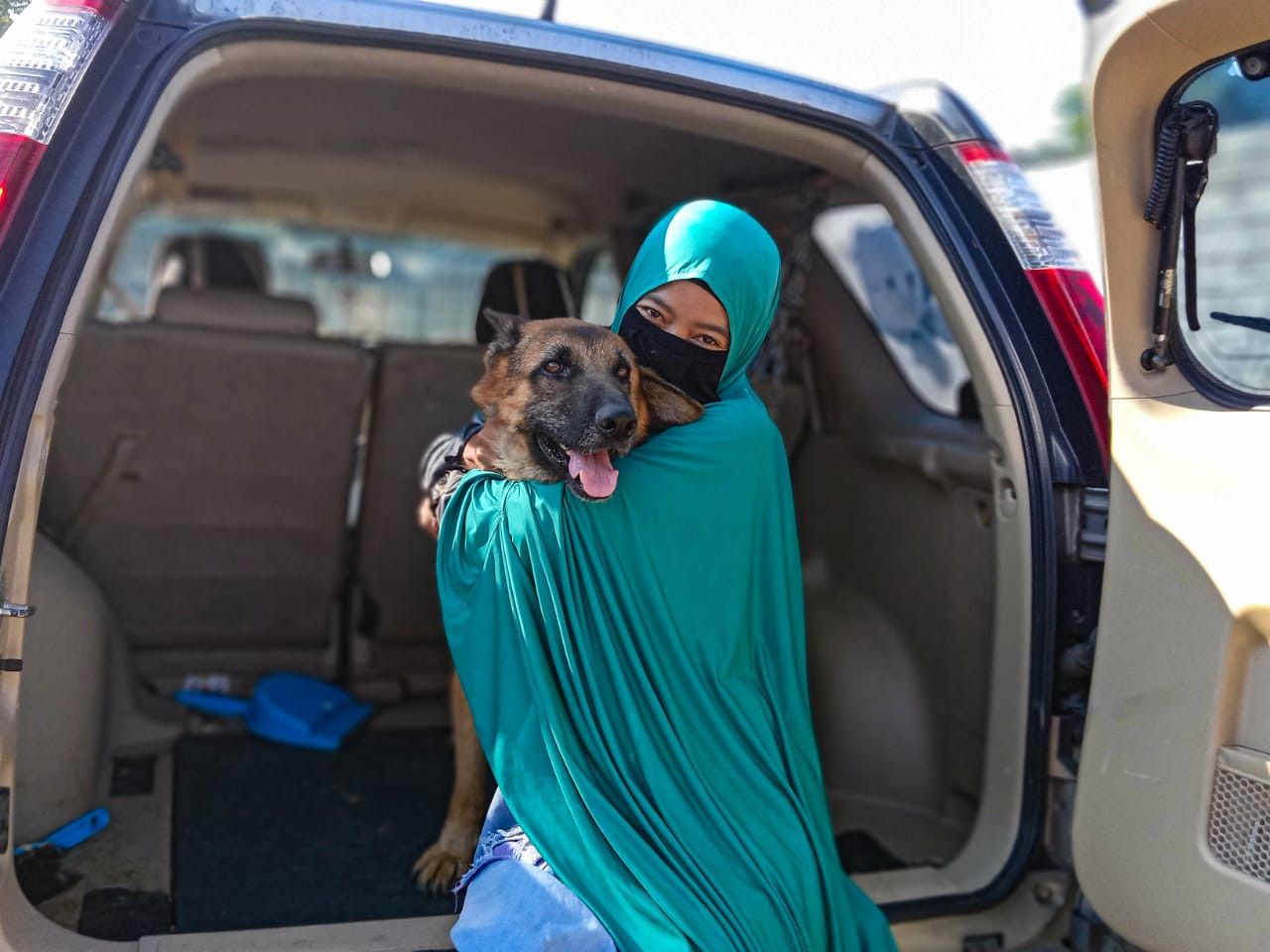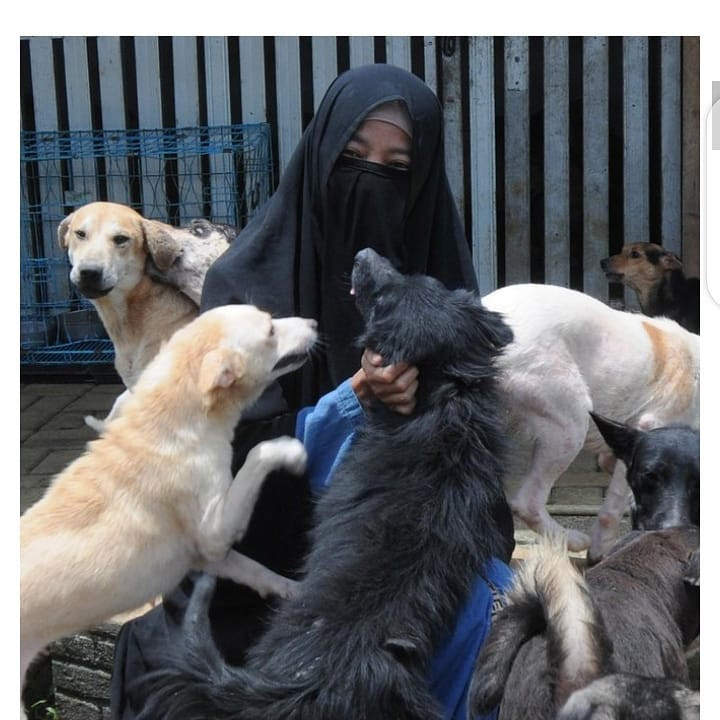Muslim lady and the tramp: Meet the unlikely dog whisperer
Caught between Islamic teachings about the impurity of canines and her deep affection for them, Suesti has doggedly chosen to adopt 81 strays despite being hounded by critics.
Change Size
 Hesti Sutrisno. (JP/Suesti's Instagram account)
Hesti Sutrisno. (JP/Suesti's Instagram account)
S
ome may find it peculiar that 40-year-old Suesti, who wears a niqab and is known as Hesti Sutrisno on her social media accounts, is a dog lover.
The mother of three, who sells chips and crackers for a living, has adopted 70 stray dogs that live on her property in Tenjolaya, Bogor, West Java. Before that, she adopted 11 stray dogs in Pamulang, South Tangerang, Banten.
Traditionally, Muslims avoid canines because of religious teachings. In Islam, dogs are considered unclean, especially their saliva, and they are rarely kept as pets. Some Muslims are taught from a young age to have a strong distaste for dogs.
Initially, Suesti was afraid of dogs. She recalled two times she was chased by a dog, once as a young girl and once as she was giving her kids a ride to school.
She started as more of a cat person.
“At one point, I had at least 100 cats,” Suesti said, thinking back to 2015. She had yet to purchase property in Bogor and lived only in Pamulang at the time.
During this time, she noticed an emaciated black dog that lived in an empty house in her neighborhood. The dog – called Jhon – was so malnourished that it would sometimes eat waste paper.
“Nobody wanted to take Jhon, maybe because he was a black dog,” Suesi said.
Studies have shown that black dogs are often passed over for adoption because of fear, stigma or superstition.
Suesi’s children – twins Ayunda and Adinda, both 13 now, and Mitra, now 10 – suggested adopting Jhon, but Suesti’s fear of dogs stood in the way.
At a get-together, Suesti approached a neighbor who had a pet shih tzu and asked questions about dog ownership and Jhon the stray. Her neighbor encouraged her to get close to the dog.
“I asked my neighbor whether [Jhon] was aggressive. I asked them to accompany me,” Suesti said, adding that she was concerned because she only had cat food at the time.
The neighbor assured Suesti that Jhon was friendly and would like cat food. Gradually, she bonded with Jhon and later adopted him.
“Jhon just randomly showed up in front of my house one day. I asked him if he wanted to guard my cats. He’s stayed with me since,” she said.
Suesti had her fence modified so that Jhon could leave the yard to play. She warned him to be careful, but the neighbors were familiar with Jhon so they were never bothered by him.
Not long after adopting Jhon, Suesti encountered another stray dog while visiting her parents in Bogor. This time it was a cream-colored puppy she named Gufi. She found it by a river in her parents’ neighborhood.
“I did not think about adopting again, but when I asked around, one person suggested I should just abandon the pup. It was my children again who said I should adopt Gufi,” she said.

From there, Suesti realized it was her calling to save as many dogs as possible. She recalled performing tahajjud (night prayer) a couple of times to strengthen her resolve.
“While dogs (saliva) are considered haram, that does not mean it is forbidden to love them,” she said
Viral Facebook posts
In 2018, Suesti posted several times on Facebook expressing her affection for her adopted dogs – she had 11 at that point – and the posts triggered online debate. She learned then that her decision would spark backlash from some people, especially Muslims.
“One person said ‘Ew, how could you wear a niqab and love dogs?’ to me. This type of insult is typical. I never blame netizens. They never see me in real life, after all,” she said.
The experience instead motivated Suesti to continue saving stray dogs. She said she often had “heart-to-heart” talks with her dogs.
“I say, ‘Please pray that Bunda [Mother] can buy you more food,’ and my dogs pray for me,” she said.
Several residents of Pamulang objected to Suesti’s decision to turn her house into a home for dogs, but the situation cooled off after mediation in 2018.
She soon began to use social media platforms such as Instagram to share her devotion to rescuing dogs more broadly and uploaded Youtube videos of her activities with her beloved pets.
After gaining quite a following, she began promoting her chips and crackers and used the profits to buy a property in Bogor that she named Green House.
In early 2021, Green House became a home for 70 dogs. Recently, it was in the spotlight amid claims that the dogs were causing disturbances.
Once again, Suesti faced backlash. She refused, however, to give up her dogs. She did not want to put her dogs in shelters, fearing the shelters would eventually abandon them.
“I have promised my dogs that I will keep taking care of them until the very end,” she said.
All of Suesti’s 11 dogs in Pamulang have been vaccinated and sterilized. As for the 70 dogs in Bogor, all of them have been vaccinated and some of them have been sterilized.
“Eventually, all of them will be sterilized. I’m still collecting funds from the profits of my [chip and cracker] sales for that,” she said, adding that while she sometimes received donations, most of the funds for the dogs came from her own pocket.
Muslims and dogs
Suesti said she hoped Indonesian ulemas would change their tone about dogs, especially during sermons, to quell the hatred that some Muslims showed toward the creatures.
“Ulemas shouldn’t just emphasize the fact that dogs (saliva) are (considered) haram. Instead, they should explain that dogs are still Allah’s creations and that we should care for them regardless,” she said.
Once, a fellow Muslim woman sent Suesti a message on Facebook thanking her for showing that it was possible for Muslims to love dogs. The woman, who also wore a niqab in her Facebook photos, told Suesti that she had begun feeding stray dogs and had started fostering some as well.
Suesti’s neighbor Umar Sobari, a 42-year-old ustadz (Muslim teacher), adopted three dogs and trained them to guard his shrimp farm. He agreed that ulemas should change their tone about dogs so that prevailing Muslim attitudes about the creatures would change.

“The heart of a person who hates dogs without any reason is even more impure than the dogs themselves,” he said, citing Islamic teachings that appealed to Muslims to love all living things.
Suesti has pleaded with Bogor Regent Ade Yasin to create a policy that would ensure she would be able to keep the dogs on her property.
“No religion obligates hatred of dogs,” she said.









